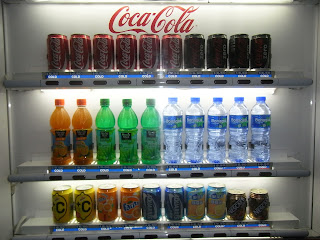In
my Trust’s staff canteen you get a subsidy off hot food (Including deep fried
chicken and chips) but no subsidy for cold food (Including all salads and
sandwiches). Which foods do they encouraging me to eat more of?
NHS
England has announced that it wants to cut NHS staff obesity, and to do that
they want to cut the consumption of sugary drinks in hospital, even banning the
sales of them (1). It is recommended that we get only 10% of our daily energy
intake from sugar, which equals 70g of sugar for men and 50g for women (2). A can
of Old Jamaica ginger beer contains 52g of sugar, Coca Cola and Pepsi contain
36g (3). It is easy to see how these “full fat” drinks can surpass our daily
sugar intake in only two different drinks, and that’s not counting the sugar
found in our food.
NHS
England claims that 700,000 NHS staff who are overweight (1). They say that because
this affects people’s personal health it also increases rates of sickness (1).
The NHS does have a problem with sickness. The NHS sickness rate, for last
year, was 3.93% (4), which does not compare well to the national rate, for the
same time, of 1.9% (5). Now all this sickness cannot be blamed on staff’s
waistlines, even though it is always a good escape-goat. The high workload levels
in the NHS and the ensuing stress levels surely have an effect on sickness
rates.
The
NHS has become an increasingly more stressful place to work. Cuts to resources
and funding (in real terms), staff shortages (there are now 21,205 empty
nursing posts in the NHS, 10% of the nursing workforce (6)), and increasing
demand on NHS services (patients attending A&E Departments has increased by
6% in the last year (7)). It has all had a detrimental effect on staff. An RCN
survey found that many nurses were too busy to take their breaks during a
shift, or were even drinking enough water to keep hydrated (8), and this was
happening right across the NHS, not just in emergency care. Yet it is a legal
requirement that workers have three breaks during a shift, at least one being a
twenty minute uninterrupted one, if we work for six hours or more, as part of
working time regulations (9).
 As
a Community Nurse, I have forgotten the last time I took my lunch break, I am
just too busy to do so. I come back to our office, after a full morning
visiting patients, and immediately start my patient follow-up at my desk
(Ordering medications and dressings for patients, referring patients to other
services, catching up on my paperwork). Because I have afternoon patient visits
this is the only chance I have for patient follow-up, my lunch break. Therefore
my lunch is snatched at my desk, because of this I need food that is easily
eaten, sandwiches and bottled drinks. I am not the only nurse who does this.
When lunch has to be snatched then it has to be something quick and easy to
eat, processed and fast food provides this, even though they are not the
healthiest of options.
As
a Community Nurse, I have forgotten the last time I took my lunch break, I am
just too busy to do so. I come back to our office, after a full morning
visiting patients, and immediately start my patient follow-up at my desk
(Ordering medications and dressings for patients, referring patients to other
services, catching up on my paperwork). Because I have afternoon patient visits
this is the only chance I have for patient follow-up, my lunch break. Therefore
my lunch is snatched at my desk, because of this I need food that is easily
eaten, sandwiches and bottled drinks. I am not the only nurse who does this.
When lunch has to be snatched then it has to be something quick and easy to
eat, processed and fast food provides this, even though they are not the
healthiest of options.
Banning
or surcharging sugary drinks might be a step in the right direction but it is
only a small step and not the complete solution for improving staff’s health.
Management could take much more sweeping measures to help make staff’s working
environments make them more healthy, such as: reducing workplace stress, being
realistic with workloads and ensuring staff are not regularly over-stretched; make
breaks compulsory and ensure staff take them, and provide staff rooms away from
the clinical area for staff to take their breaks; encourage training away from
the clinical area were staff can keep themselves up to date; and provide staff
with decent on site gyms. There is a lot to be done to promote staff health.
And this shouldn’t be done because staff are “role models” or just to reduce
sickness, it should be done to benefit staff.
Of
course even if they do ban the sale of sugary drinks in hospitals this will have
no effect on many NHS staff’s lives, those who work in the community.
What
leaves a cynical taste in the mouth is that this is the cheapest and least
option they could do, banning the sale of sugary drinks. It costs nothing,
would be easy to implicate and could actually generate positive publicity.
Aren’t we, NHS staff, worth more than a cheap stunt? The NHS’s staff are its
biggest resource and yet our well-being seems to be of a lower priority then
painting hospital buildings. Who cares about NHS staff, not the NHS?
Drew
Payne

No comments:
Post a Comment